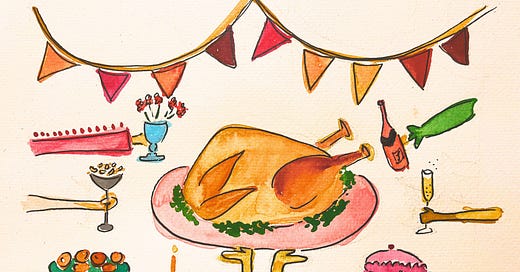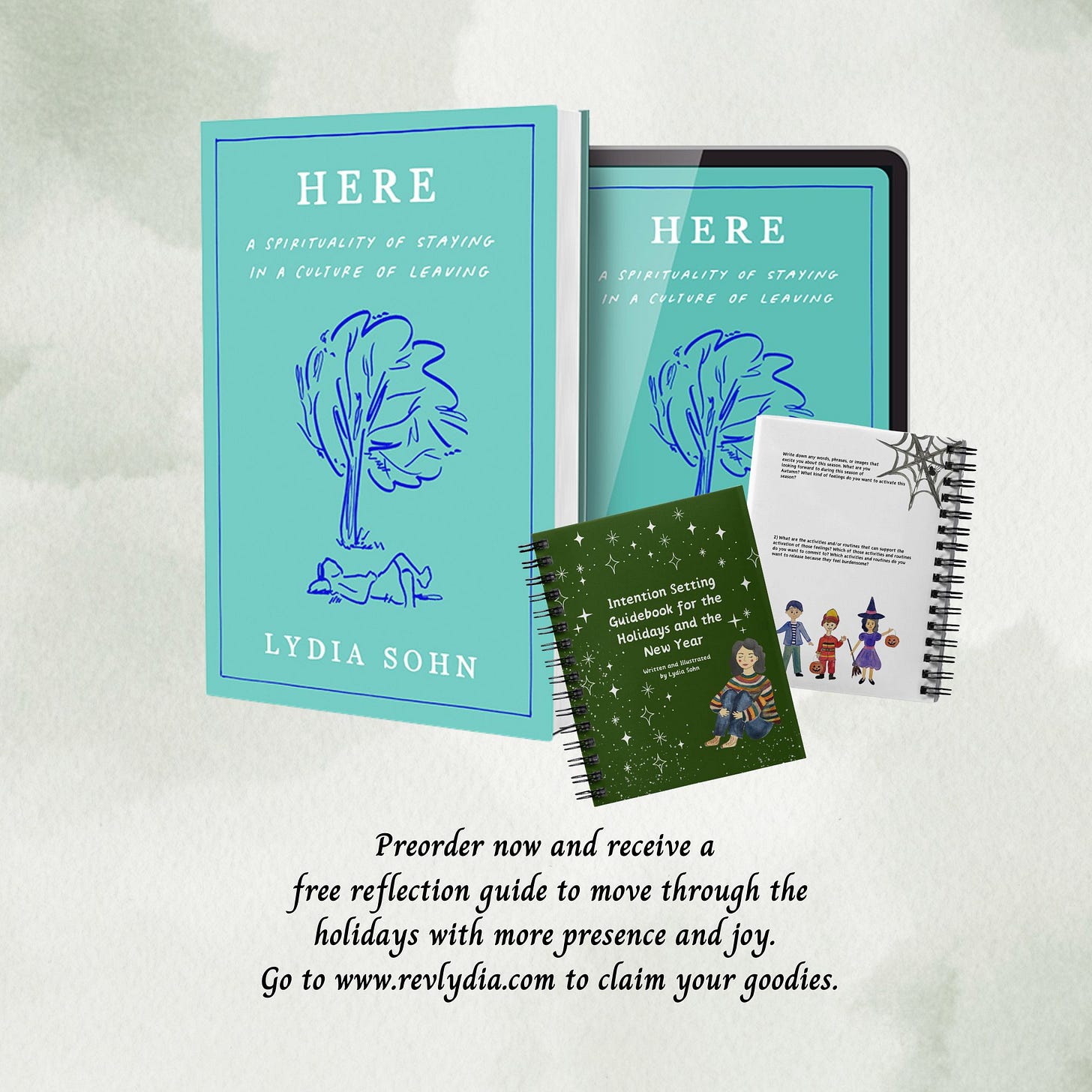November has arrived.
And with that, annual festivities we’ve been eagerly anticipating (or dreading). In addition to these celebrations, those of us in America just passed a momentous Presidential election that many of us are still mentally and emotionally unraveling. Our two-party political system has only intensified these past few years with a chasm now so large that it’s difficult to converse with those on the other side.
Sentiments I keep hearing around me are things like, “I want to unfriend my uncle on Facebook because of the crazy political propaganda he posts” or “I don’t have much in common with my parents anymore because we’re on two radically opposing sides of the political spectrum.”
It’s tempting, I know, to cut those ties to make life simpler, less messy. And I want to remind all of us: messy’s okay. Messy is what comes with being a part of communities filled with people filled with emotions, opinions, varying life perspectives.
Messy, Parker Palmer wrote, is at the heart of democracy. And when we hurt one another and break one another with our ideas and words and opinions, we have two choices. We can either break apart or we can break open. Breaking apart means estrangement, isolation, further cloistering ourselves to a teeny tiny world where we’re safe but not challenged or expanded. Breaking open means opening ourselves up to all the emotions that emerge from these conflicts, broadening our perspective and deepening our compassion for others we don’t see eye-to-eye with.
And these two pathways apply not just for those of us who have difficulty relating to others with diverging political beliefs but for those of us who are in conflict with others for any other reason.
Messy’s okay. And not just that, messy keeps us happy. Hard to believe? Almost all the happiness studies within the past two decades reveal that people are happier and live longer when they’re a part of cohesive as opposed to individualistic communities.
And the belief that we’d be happier if we just excise the “difficult people” in our lives as easily as a child cuts the edges of paper to have a clean figure…is a myth.
Estrangement seems to be more and more common these days, or at least, it’s getting more press. Just this past summer, there were a slew of essays about family estrangement (e.g. “Why So Many People Are Experiencing Family Estrangement” (Vogue), “What’s Ripping American Families Apart?” (NYT), “Is Cutting Off Your Family Good Therapy?” (NYT) and “Why So Many People Are Going ‘No Contact’ with Their Parents” (New Yorker)).
Some of my very own congregation members and friends have intentionally estranged themselves from their families or family members. Their reasons are always good, air-tight. I listen and nod sympathetically to their side of the story. There’s not much to push back against.
But when they share these stories and reasons, they share them with tears in their eyes. They’re not lighter. They’re not more liberated. They’re not more joyful.
At this point, I need to make a strong, strong caveat that sometimes, cutting people off is the best course of healing for all parties involved, especially when abuse or addiction are a part of the picture.
But for most of us, we’re tempted to cut people out not because of those factors, but because we don’t know how to make space for people different from us or how to hold their unique frailties. Or their frailties trigger our own. We claim “they’re difficult” but could it be just as possible that we are the difficult ones? Could it be that the very words we use to describe these people we can’t stand are applicable to ourselves?
The holidays can magnify these complicated feelings and anxieties because it’s a time when family members and relatives gather together. And there are just some family members we’d rather not see or speak with, for that matter.
All of that is okay and not something you need to force yourself out of.
At the same time, if there’s some space within yourself that’s ready for a bit of movement towards forgiveness, compassion and understanding, I want you to know it’s possible.
And not only is it possible, but research suggests it’s the path of greatest fulfillment and joy.
During these fall and winter months, as the days become darker in the northern hemisphere, the traditional festivities from Christmas to Yule to Diwali to Hanukkah all center upon the significance of light shining brightest in the dark. In the same way, within all of us is an inner light that nobody can ever extinguish, no matter what we’ve done or not done, and no matter what others have done or not done to us.
With this in mind then, we are free to shine our light and extend our love, compassion and forgiveness without feeling like we’re extinguishing or compromising the light of our true selves.
So how do we shine that light? Right where you are, with all your messy feelings and heavy emotions. Let those feelings exist without pushing them down. Honor them, feel them. Don’t judge yourself for having them.
Then, when you’re ready, you can start to make some inner shifts by moving through these reflection questions.
Whip out some paper and something to write with in a quiet space. Then, respond to these prompts with whatever comes to mind. Don’t think too hard or try to make your responses sound eloquent or even coherent. Images and one word answers are just fine. Some of the questions below are emotionally heavy so please do not pressure yourself to work through all of these in one day or in one sitting. You can even disperse them throughout the week.
These prompts are also included in my free holiday guidebook that you can access immediately upon preordering my book, Here: A Spirituality of Staying in a Culture of Leaving if you’d prefer to work through these prompts with hand-illustrated watercolor images in a bigger reflection journal for the entire holiday season. (Speaking of the book, a million thank you’s to everyone who has already preordered my book. Being in this phase of launching my book into the world, I am learning just how much preorders can alter the destiny of a book. I’ll also mention that writing the book in the safety of my own office felt so much more comfortable than promoting it, which requires a lot of vulnerability and boldness. So, for all those reasons, thank you, thank you, thank you for your support during this launch season).
Okay, so onto these transformative reflection questions! Tackle them when you feel emotionally ready and you’re in a physical and emotional space to do so.
How has your loved one hurt you?
For the purpose of moving you toward forgiveness, I invite you consider this perspective: People don’t know how to be other than they are. How they talk, behave, and think are all a result of their background, social conditioning, and biological makeup. They’re not trying to be rude or hurtful. They’re acting from entrenched or learned behaviors and patterns. How does it feel to take on this new perspective in regards to the person you feel harmed by?
Write down five ways they’ve been good to you over the years (big or small).
Write down how your relationship would shift if you gave up the thought that your loved one is intentionally trying to hurt you. They may actually be doing the best they can with the mental resources they have at hand.
What is a perspective on this conflict that you have not considered? Step into the other person’s shoes and write down how they might be seeing the situation.
Finish this sentence: If I were more conscious of this person, I’d realize . . .
Write a letter of love and appreciation from the person you’re in conflict with addressed to you.
Move at your own pace, dear friends. None of this ever needs to be rushed. In fact, sometimes, a little distance and time can do more wonders than rigorous self-reflection. Meanwhile, let your light dazzle so bright, knowing that nothing can ever harm or extinguish it.







I agree that life is messy and human relationships are the messiest! But to conflate "unfriending" someone on Facebook with estrangement of family is just not accurate. In 2016, I didn't unfriend those that had different political views because while I hated the posts, I loved the posters! But this time around, I have unfriended EVERYONE who posts an opposing political or religious view in order to preserve the relationships. I have the right to keep my social media feed a safe place for me and if someone has an opinion that they're desperate for me to hear, they can say it to my face and we can discuss. So, I'll keep up the relationships in real life but we will not be sharing our lives through social media anymore. I don't want to be at the end of my life and realize with sorrow that I let politics get in the way of my relationships with friends and family. Again, unfriending and unfollowing is the best way to do that right now.